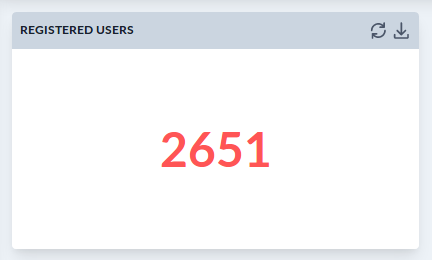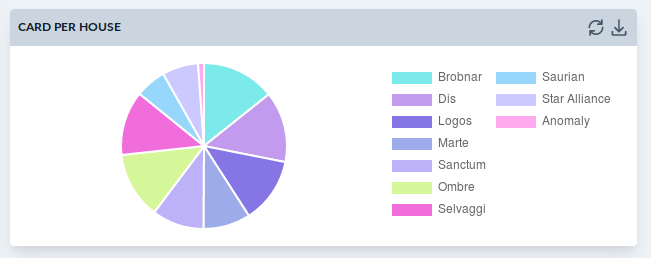| Package Data | |
|---|---|
| Maintainer Username: | alberto.bottarini |
| Maintainer Contact: | alberto.bottarini@gmail.com (Alberto Bottarini) |
| Package Create Date: | 2019-08-20 |
| Package Last Update: | 2022-09-23 |
| Home Page: | |
| Language: | PHP |
| License: | MIT |
| Last Refreshed: | 2024-04-14 15:00:06 |
| Package Statistics | |
|---|---|
| Total Downloads: | 16,686 |
| Monthly Downloads: | 14 |
| Daily Downloads: | 0 |
| Total Stars: | 95 |
| Total Watchers: | 9 |
| Total Forks: | 25 |
| Total Open Issues: | 6 |
Laravel Bi is a beautiful and fully-featured Business Intelligence dashboard manager for Laravel.

Install Laravel Bi using composer:
composer require laravel-bi/laravel-bi
and then run
php artisan bi:install
to setup all Laravel Bi components and to create a simple UserDashboard.
Run this artisan command to update assets:
php artisan vendor:publish --tag=bi-assets --force
Laravel BI v1.0.0 requires Laravel 8.0. If you have a previous Laravel version, please consider to use v0.0.5.
Laravel BI requires users to be logged. If your application does not have a custom authentication process, I suggest you to install Laravel Breeze.
You can add new dashboard to your project using this command
php artisan bi:dashboard FooDashboard --model=FooModel
Laravel Bi uses dashboards to show data to the users. Each dashboard contains widgets. Each widget presents data to your user using different tool. Each widget's metrics and dimensions are fully customizable.
At the moment, Laravel BI works only with mysql databases.
Attributes are common representation of Dimension and Metric. You can instantiate Attribute using create static method. It accepts 2 parameters:
StringDimension::create('name', 'The Name');
SumMetric::create('unique_name_for_some_of_prices', 'The Sum');
Some extra methods are available:
column($columnName) to set a custom database column name (defaulted to key)color($color) to set a custom color for the attribute (it will be used in charts)You can chain all these methods:
SumMetric::create('unique_name_for_some_of_prices', 'The Sum')
->column('price_column')
->color('#FF0000');
Dimensions are attributes of your data. Laravel-Bi is shipped with some preconfigured dimensions:
StringDimensionIt represents a string column. No transformation or logic are applied. It comes to your widget as it is saved in your database.
YearDimensionIt represents a year. It applies a DATE_FORMAT clause to your database query in order to take only year digits. Its default format is %Y (e.g. 2019).
MonthDimensionIt represents a month. It applies a DATE_FORMAT clause to your database query in order to take only year and month digits. Its default format is %Y-%m (e.g. 2019-01).
DayDimensionIt represents a day. It applies a DATE_FORMAT clause to your database query in order to take only year, month and day digits. Its default format is %Y-%m-%d (e.g. 2019-01-15).
DateDimensionIt represents a date. It allows to set a custom DATE_FORMAT clause using format() method.
It has a one custom method:
format($format) to set a custom DATE_FORMAT format.DateDimension::create('year_week', 'Year Week')
->format('%Y-%u');
BelongsToDimensionIt represents a string value taken from a BelongsTo relationship. It comes from a JOIN clause in order to use it in filters or in sorting.
It has a two custom methods:
relation($relationName) to set a eloquent relation nameotherColumn($columnName) to set the related object columnBelongsToDimension::create('product_name', 'Product')
->relation('product')
->otherColumn('name');
RawDimensionIt represents a raw dimension you can edit as you want using raw method.
It has a one custom method:
raw($rawClause) to set a custom raw clauseDateDimension::create('initial_of_name', 'Initial')
->raw('LEFT(name, 1)');
You can easily use them in your widgets or create your custom dimensions. Please take a look to the existing dimensions.
Metrics are quantitative measurements. Each metric show absolute values. If you need to show percentage of the total, you can use asPercentage() method
Laravel-Bi is shipped with some preconfigured metrics:
CountMetricIt is a simple metric that count number of records. This is not related to a particular column.
SumMetricIt sums a particular column values.
AverageMetricIt calculate average of a particular column values.
RawMetricIt represents a raw metric you can edit as you want using raw method.
It has a one custom method:
raw($rawClause) to set a custom raw clauseDateDimension::create('discounted_price', 'Discounted Price')
->raw('price * 0.9');
You can easily use them in your widgets or create your custom dimensions. Please take a look to the existing metrics.
Widgets are graphical representation of your data that use Dimensions and Metrics to gather information. You can instantiate Widgets using create static method. It accept 2 parameters:
BigNumber::create('order_number', 'Orders')
You can attach attributes to a widget using:
dimensions($dimensions) to set an array of dimensionsdimension($dimension) to set a single dimensionmetrics($metrics) to set an array of metricsmetric($metric) to set a single metricTable::create('table', 'Table')
->dimension([
BelongsToDimension::create('product', 'Product')
->relation('product')
->otherColumn('name');
])
->metrics([
SumMetric::create('price', 'Revenues')
]);
Some extra methods are available:
width($widthClass) to set a custom width (it should be a Tailwind CSS w- class)scope($closuer) to set a particular scope for a widgetYou can chain all these methods:
BigNumber::create('order_number_with_price_greater_than_10', 'Big Orders')
->width('w-1/2')
->scope(function(Builder $builder) {
return $builder->where('price', '>', 10);
});
Laravel-Bi is shipped with some preconfigured widgets:
BigNumberIt shows a particular and relevant metric as a KPI. It accept a single metric.

TableIt shows some dimensions and metrics organized in a table allowing user to apply a custom sorting. It accept multiple dimensions and metrics.
It has a one custom method:
orderBy($column, $dir) to set a custom orderBy clauseTable::create('user-per-country', 'User per Country')
->dimensions([
StringDimension::create('country_code', 'Country'),
])
->metrics([
CountMetric::create('count', 'Count'),
])
->orderBy('count', 'desc')
LineChartIt shows a line chart with different axis on a single horizontal dimension. It accept a single dimension and multiple metrics.

PartitionPieIt shows a pie chart with a single metric and a single dimension. It accept a single dimension and a single metric.

Filters are special tools that allow users to filter data in each dashboard. You can instantiate Widgets using create static method. It accept 2 parameters:
StringFilter::create('type', 'Type')
Laravel Bi is shipped with some preconfigured filters:
StringFilterIt shows a multiple combo with all the possible values of a particular column.
NumberFilterIt shows a number control to select different operators.
DateFilterIt shows a calendar to select a date.
DateIntervalFilterIt shows a range calendar to select a day interval.
Each dashboard presents 2 method: filters() and widgets() and 3 properties model, uriKey, name.
You have to implement methods returning respectively a list of filters and a list of widget.
public function widgets()
{
return [
BigNumber::create('post-count', 'Number of Posts')
->metric(CountMetric::create('count', 'Count'))
->width('w-1/2')
];
}
Thanks to https://github.com/sschoger/heroicons-ui